This content originally appeared on Radio Free Europe/Radio Liberty and was authored by Radio Free Europe/Radio Liberty.
This post was originally published on Radio Free.
This content originally appeared on Radio Free Europe/Radio Liberty and was authored by Radio Free Europe/Radio Liberty.
This post was originally published on Radio Free.
Top UN human rights officials are expressing alarm over the recent wave of violent repression by university administrators against the student protests for Palestinian liberation that have swept the U.S., raising concerns that protesters’ rights to free speech and assembly are being violated. A statement on Tuesday said that UN High Commissioner for Human Rights Volker Türk, the UN’s top human…
This post was originally published on Latest – Truthout.
Comprehensive coverage of the day’s news with a focus on war and peace; social, environmental and economic justice.

The post The Pacifica Evening News, Weekdays – April 30, 2024 Columbia campus protests escalate with building occupation and threats of expulsion. appeared first on KPFA.
This content originally appeared on KPFA – The Pacifica Evening News, Weekdays and was authored by KPFA.
This post was originally published on Radio Free.
Columbia University’s pro-Palestine protesters took over a building on campus, known as Hamilton Hall, early on Tuesday morning, after university administrators threatened students in a solidarity encampment and said that the university “will not divest from Israel” in a statement on Monday. Students occupying the building have dubbed the building “Hind’s Hall” after Hind Rajab, a six-year-old…
This post was originally published on Latest – Truthout.
A photojournalist who was violently arrested while covering a pro-Palestine student protest at the University of Texas at Austin last week is reportedly being charged with felony assault on an officer, a charge that press freedom advocates condemned as an obvious attempt to intimidate reporters. Citing court documents, a local NBC affiliate reported Monday that FOX 7 journalist Carlos Sanchez…
This post was originally published on Latest – Truthout.
This content originally appeared on Radio Free Europe/Radio Liberty and was authored by Radio Free Europe/Radio Liberty.
This post was originally published on Radio Free.
In fall 2022, they were on the streets of Tehran facing down Iranian riot police. Chanting “Woman, Life, Freedom,” their voices captured the world’s attention — until their friends were shot, loved ones arrested, and they were forced to run for their lives. Less than two years later, those same protesters now face a very different kind of danger. Having survived waves of domestic repression…
This post was originally published on Latest – Truthout.
Following the arrest of over 100 students at Columbia University on April 18, Palestine solidarity encampment protests have multiplied across the US. Police crackdowns have occurred at other schools as well, including Northeastern University in Boston, where about 102 protesters were arrested. Officials at Northeastern claimed that the protest had been “infiltrated” by organizers who had “no…
This post was originally published on Latest – Truthout.
As the Palestinian death toll in Gaza and the West Bank mounts daily, campus protests against Israel’s genocidal war on Gaza continue to spread across the U.S., where students and faculty often face police crackdowns. Student activists from Pomona Divest from Apartheid in southern California, The Coalition for Mutual Liberation at Cornell University in Ithaca, New York, and Resist WashU in St.
This post was originally published on Latest – Truthout.
As a wave of student protests against Israel’s war on Gaza continues to spread from coast to coast, schools and law enforcement have responded with increasing brutality to campus encampments. One of the most violent police crackdowns took place at Emory University in Atlanta on Thursday, when local and state police swept onto the campus just hours after students had set up tents on the quad in…
This post was originally published on Latest – Truthout.
Palestine solidarity protesters today demonstrated at the Auckland headquarters of Television New Zealand, accusing the country’s major TV network of broadcasting “propaganda” backing Israel’s genocidal war on Gaza.
About 50 protesters targeted the main entrance to the TVNZ building near Sky Tower and also picketed a side gate entrance for media workers for about an hour.
The protest climaxed a week of critical responses from commentators and critics of TVNZ’s Q&A senior reporter/presenter Jack Tame’s 45-minute interview with Israel ambassador Ran Yaakoby last Sunday which Palestine Solidarity Network Aotearoa (PSNA) secretary Neil Scott described as “a platform for propaganda to excuse the genocide happening in Gaza over the last six months”.
Waving Palestine flags and placards declaring “Bias”, “silence is complicity — free Palestine,” and “Balanced journalism — my ass,” the protesters chanted “Jack Tame, you cannot hide – you’re complicit with genocide.”
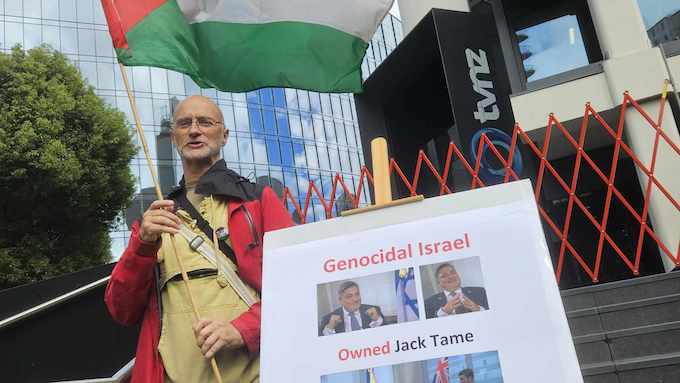
Chalked on the pavement and on the walls were slogans such as “Jack ‘Shame’ helped kill MSM”, “TVNZ stop platforming genocide and Zionism”, “TVNZ genocide apologists” and “137 journalists killed” in reference to the mainly Palestinian journalists targeted by Israeli military forces.
Across the street, a wall slogan said: “TVNZ (Q&A) broadcast Israeli lies about Gaza”. Other slogans condemned the lack of Palestinian voices in TVNZ coverage – there are about 288 Palestinian people in New Zealand, according to the 2018 Census.
Ironically, TVNZ tonight screened a rare Palestinian story — a heart-rending report about the tragic death in Gaza of a baby girl, Sabreen Joudeh, “Patience” in Arabic, who had been saved from her dying mother’s womb after an Israeli air strike on their family home.
The TVNZ report interviewed the related Gouda family in Auckland hours before Abdallah Gouda, a doctor, flew out to Turkiye to join a humanitarian aid flotilla leaving for Gaza.
PSNA’s Neil Scott criticises TVNZ coverage of Gaza. Video: Café Pacific
Criticism of ‘complicity’?
“Jack Tame, you’re a professional,” yelled PSNA secretary Scott through a loud hailer addressing TVNZ. “You know what would be set up, you have to know.
“But you allowed it to happen!”
“I don’t get you Jack, stupid or complicit? Complicit or stupid? One of the two.”
Critics are understood to be filing complaints about the alleged “one-sidedness” of the programme citing many specific criticisms.
“We’re here today because of Jack Tame’s Q&A report for TVNZ,” said Scott. Among some of his complaints were Tame:
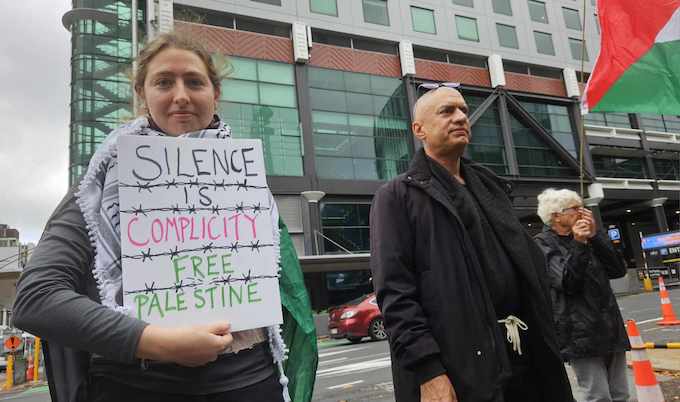
Platform for propaganda
“Essentially, Tame gave Israel a platform for propaganda to excuse the genocide happening in Gaza over the last six months,” said Scott.
Among the contextual questions that Scott claimed Tame should have questioned Ambassador Yaakoby on were the envoy’s unchallenged claim that “1400 people had been butchered” by Hamas fighters.
In fact, the documented figure is 1139 — 695 civilians, including 36 children, and 373 security force members, according to a France 24 report citing official sources.
“The ambassador didn’t mention that more than 350 Israeli soldiers were among those killed — at their military posts,” Scott said.
“Many of the others were aged between 18 and 40 and in the military reserves.”
Also, no mention was made of the controversial Hannibal Directive which reportedly led to the Israeli military killing many of its own countrymen and women captives as the resistance fighters retreated back to Gaza.
The controversial Q&A interview with Israeli Ambassador Ran Yaakoby. Video: TVNZ
Among other responses to TVNZ’s Q&A this week, Palestine solidarity advocate and PSNA chair John Minto declared in an open letter to TVNZ published by The Daily Blog that the programme “breached all the standards of decent journalism. In other words it was offensive, discriminatory, inaccurate and grossly unfair.”
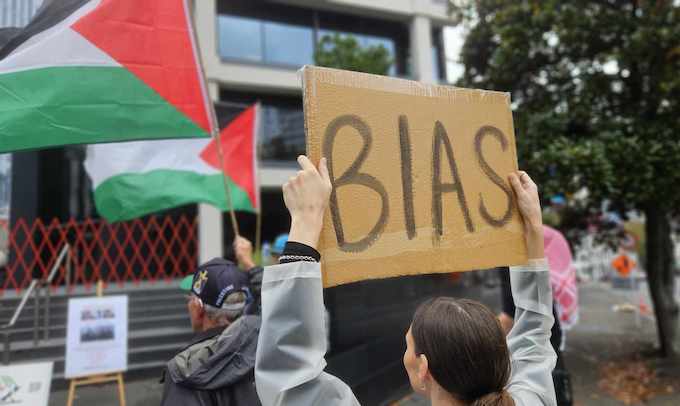
‘Unchallenged lies’
“It wasn’t journalism – it was 45-minutes of uninterrupted and unchallenged Israeli lies, misinformation and previously-debunked propaganda. It was outrageous. It was despicable,” Minto wrote.
“The country which for six months has conducted genocide against the Palestinian people of Gaza was given free rein to pour streams of the most vile fabrications and misinformation against Palestinians directly into the homes of New Zealanders. And without a murmur of protest from Jack Tame.
“Even the most egregious lies such as the ‘beheaded babies’ myth were allowed to be broadcast without challenge despite this Israeli propaganda having been discredited months ago.
“The interview showed utter contempt for Palestine and Palestinians as well as New Zealanders who were assailed with this stream of racist deceits and falsehoods with Q&A as the conduit.”
Among a stream of social media comments, one person remarked “On John Tame’s YouTube channel it gained a lot of comments fairly quickly . . .
“These comments were encouraging as at least 95 percent were denouncing the interview . . . with a lot of them debunking the endless stream of blatant lies and atrocity propaganda that poured out of the Israeli ambassador’s mouth.
“Most of the posters were obviously from our country and it was a great example of how Israel’s actions have shattered its reputation with their propaganda fooling hardly anyone anymore.
“It’s a bit like a little child with chocolate all over their face denying they ate the chocolate . . . except in Israel’s case it’s civilian blood all over their face . . .
“Anyway, when I revisited the thread the comments had been purged and deleted.”
On the Q&A YouTube channel, @ZaraLomas commented: “The fact that Q&A are deleting critical comments speaks volumes about their integrity (or lack thereof), and their faith in this shocking piece of ‘journalism’.
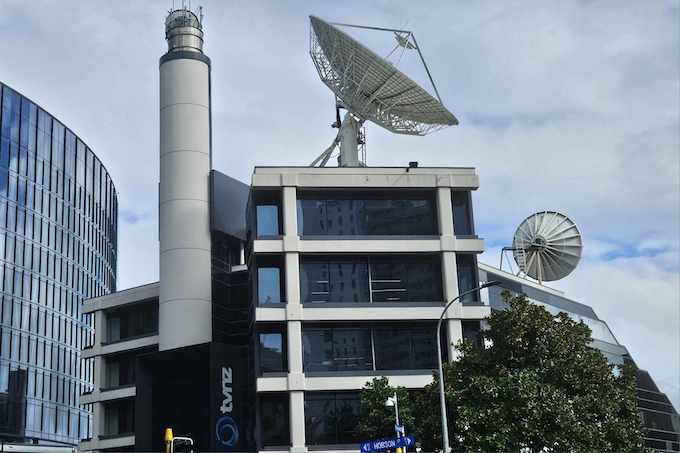
This post was originally published on Asia Pacific Report.
Jewish U.S. Sen. Bernie Sanders issued a scathing statement Thursday pushing back against Israeli Prime Minister Benjamin Netanyahu’s characterization of burgeoning protests on American university campuses as “antisemitic,” declaring, “It is not antisemitic to hold you accountable for your actions.” “No, Mr. Netanyahu. It is not antisemitic or pro-Hamas to point out that in a little over six…
This post was originally published on Latest – Truthout.
Faculty from universities across the country have begun to mobilize in solidarity with the student movement for Palestine. From NYU, where faculty linked arms to protect students from police; to Columbia University, where faculty engaged in a solidarity walkout with the Gaza Solidarity Encampment; to Barnard College, where faculty planned a sick-out in defense of their students — faculty are…
This post was originally published on Latest – Truthout.
Grants Pass, Oregon, population 39,000, has passed three ordinances since 2017 to prohibit “sleeping on public sidewalks, streets, or alleyways,” and prohibit camping on “sidewalks, streets, alleys, lanes, public rights of way, parks, benches, or other publicly-owned property or under bridges or viaducts.” According to University of Mississippi law professor William W. Berry III…
This post was originally published on Latest – Truthout.
Student protests calling for university divestment from Israel and the U.S. arms industry have rocked campuses from coast to coast. The nonviolent protests, which have been characterized as “antisemitic” for their criticism of Israel, have been met with an intensifying police crackdown as university administrators threaten academic discipline and arrests. On Wednesday, local and state troopers…
This post was originally published on Latest – Truthout.


Protests in and around Columbia University in support of Palestine and against Israeli occupation. Photograph Source: SWinxy – CC BY-SA 4.0
The student protests on the campus of Columbia University this April have reminded me of the protests that took place there 56 years ago. Along with about 700 or so other men and women, I was arrested and jailed at the Tombs in Manhattan. Those arrests didn’t curtail student protests. Indeed, there were demonstrations later that year and again in 1969, 1970, 1971 and 1972. When push comes to shove, Columbia has called on the police again and again and the police have arrived in force and have made arrests.
The current president of Columbia, Minouche Shafik, an Egyptian-born American economist and a baroness, has surely not acted on her own impulses to establish what she might call “Law and Order.” Rather, she has surely followed the orders, the prayers and wishes of trustees, deep pockets and alumni who have wanted to see demonstrators punished for exercising freedom of speech and for practicing old-fashioned American civil disobedience.
Robert Kraft, the New England Patriots CEO, and a major financial contributor to Columbia —and my classmate— recently said, “I am no longer confident that Columbia can protect its students and staff and I am not comfortable supporting the university until corrective action is taken.” He also said, “I believe in free speech, say whatever you want, but pay the consequences.” That doesn’t sound like free speech, not if it comes with a price tag. Back then, the protests were largely about Vietnam. Now, they’re largely about Gaza and Israel. The names have changed, but the underlying story is much the same. Shouldn’t students today have a significant role to play when and where it comes to university investment?
Columbia University president Shafik was deputy governor of the Bank of England, and a vice president at the World Bank. She surely knows who has buttered her side of the crumpet and who has poured her cup of tea. Over many decades, Columbia has known very well how to make cosmetic changes and alter its image. It is now, as it was in the 1960s, about making money, expanding and occupying more and more of the island of Manhattan, and about mass-producing students to become consumers and citizens loyal to the social institutions that have made the US a global superpower.
In the late 1960s and early 1970s, we raised awareness about the university’s collaboration with the war machine and with institutions of racism and patriarchy. Columbia began to hire women and Black and brown intellectuals and to revise the curriculum in response to student demands to make education relevant to their own lives and their times.
In 1968, I was not a student at Columbia. I was already a professor at the State University of New York who had graduated from the college in 1963 when it was still locked in the mindset of the Cold War, and McCarthyism and could not be accurately described as an “Ivory Tower.” In 1968, my beef with Columbia had its roots in my undergraduate years when I was rebuked for using Marxist sources for essays I wrote for teachers and slammed for thinking critically and questioning academic dogma. In 1969 when I was arrested again for my role during a campus protest, one of my former professors said that since I was a “Columbia scholar and a Columbia gentleman” I should apologize to the university. When I declined to knuckle under, the powers that be had me arrested and jailed. Who then was the scholar and the gentleman?
My freshman year at Columbia, my classmates and I were required to read Jacques Barzun’s tome The House of Intellect. It didn’t take long for me to see that the house of intellect was a house of cards. In 1968, we didn’t blow it down or blow it up, but we rocked it for a time and then watched as it put its house back in order and restored its foundations.
I don’t believe it’s possible to dismantle Columbia now, much as it wasn’t possible to dismantle it in 1968. It’s too big, too powerful, too wealthy and too rapacious. But protesters today can certainly raise awareness about the political and economic ties between the US “power elite,” as Columbia professor, C. Wright Mills called it, and the power elite in Israel. Things may not improve in the Middle East any time soon, but they won’t stay the same way they have been for the past half-century, either. The student protesters with their tents on campus are a sure sign that the times have changing and will go on “a-changin’” as Dylan suggested.
Too bad Columbia is locked in the past. Too bad it has given up on meaningful dialogue with student protesters today. Too bad it doesn’t see the handwriting on the wall. Over the past few weeks, I’ve wondered what Columbia professor Edward Said, the author of Orientalism—and for a time an independent member of the Palestinian National Council—would think and say. Indeed, he seemed to occupy a kind of middle ground when he observed in 2003, the year he died, that with regard to Palestine, “nobody has a claim that overrides all the others and entitles that person with that so-called claim to drive people out!”
That middle ground seems to have evaporated. Indeed, the ground under our own feet has shifted dramatically. There is less room for dissenting opinions today than there was in ’68, near the height of the war in Vietnam. There are also more virulent anti-Arab and more virulent anti-Jewish voices today than there were then. Better prepare for the rocky road ahead.
The post Columbia Protests Now and in ‘68 appeared first on CounterPunch.org.
This content originally appeared on CounterPunch.org and was authored by Jonah Raskin.
This post was originally published on Radio Free.
Students and activist staff at Australia’s University of Sydney (USyd) have set up a Gaza solidarity encampment in support of Palestinians and similar student-led protests in the United States.
The camp was pitched as mass graves, crippled hospitals, thousands of civilian deaths and the near-total destruction of infrastructure haunted Gaza with Israel’s war on the besieged Palestinian coastal enclave passing the 200 days milestone.
Nearly 85 percent of Gaza’s 2.3 million people have been displaced and more than 14,500 children killed in the attack, which critics have dubbed a war of vengeance.
In Sydney, according to the university’s student newspaper, Honi Soit, the camp was established on the campus when tents were pitched “emblazoned with graffiti reading ‘Free Palestine’ and ‘from the river to the sea’”.
Students form several Australian universities were in attendance for the launch of the encampment, which was inaugurated with a student activist “speak out” on the subject of the war on Gaza and the demand for USyd management to drop any ties to the state of Israel.
According to the student newspaper: “Many chants that were used on US campuses in the past week were repeated at the encampment tonight like “disclose, divest, we will not stop, we will not rest” followed by “Albanese/Sydney Uni you will see, Palestine will be free”.
Making our message clear!
We won’t let our university get away with being complicit with the weapons companies that arm the genocide in Gaza.#gazacampusyd #FreePalestine #FreeGaza #fromtherivertothesea pic.twitter.com/LHOqFsRg1B
— USyd SFP | Join the Gaza Solidarity Camp! (@SFP_USyd) April 24, 2024
Pro-Palestinian protests are gaining momentum at colleges and universities across the United States with street protests outside campuses as police have cracked down on the demonstrators.
Students at New York University, Columbia, Harvard and Yale are among those standing in solidarity with Palestinians and demanding an end to the war on Gaza.
Tensions flare at US universities over Gaza protests.
Tensions between pro-Palestinian student protesters and school administrators flared at several US universities Monday, as in-person classes were cancelled and demonstrators arrestedhttps://t.co/ByWzL8ZWhN pic.twitter.com/W5I08JqoBg
— AFP News Agency (@AFP) April 23, 2024
Al Jazeera’s Kristen Saloomey, reporting from New York, said student demonstrators from New York University (NYU) gathered for hours in a park just off the campus to protest against the genocide.
The protest moved to the park following the mass arrest of 133 students and academic staff who had participated in a protest on the NYU campus the night before.
“As news spread of their arrests, so have demonstrations around the country — at other colleges and universities,” Saloomey said.
Columbia announced that it was introducing online classes for the the rest of the year to cope with the protests.
Watch Saloomey’s AJ report:
Columbia protests: Chants of ‘Azaadi’. Video: Al Jazeera
The Al Jazeera Explainers team have put together a comprehensive report detailing the numbers that highlight the unprecedented level of violence unleashed by Israel on Gaza in the 200 days of war.
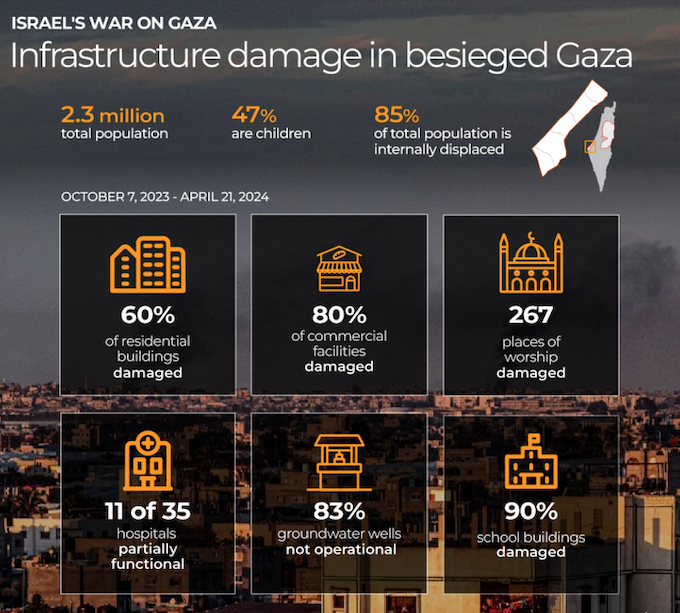
This post was originally published on Asia Pacific Report.
This content originally appeared on Radio Free Europe/Radio Liberty and was authored by Radio Free Europe/Radio Liberty.
This post was originally published on Radio Free.
COMMENTARY: By Murray Horton
New Zealand needs to get tough with Israel. It’s not as if we haven’t done so before.
When NZ authorities busted a Mossad operation in Auckland 20 years ago, the government didn’t say: “Oh well, Israel has the right to defend itself.”
No, it arrested, prosecuted, convicted, imprisoned and deported the Israeli agents, plus made them pay a big sum of damages. And it refused to restore normal diplomatic relations with Israel until Israel apologised to NZ. Which Israel did.
Today’s government needs to treat Israel the same way it treats other aggressors, like Russia, with the likes of sanctions.
And the government needs to designate Zionism as an inherently racist, terrorist ideology.
Everyone knows that the Gaza War would stop in five minutes if the US stopped arming Israel to the teeth and allowing it to commit genocide with impunity.
Israel is the mass murderer; the US is the enabler of mass murder.
New Zealand is part of the US Empire. The most useful thing we could do is to sever our ties to that empire, something we bravely started in the 1980s with the nuclear-free policy. Also, do these things:
I never thought I’d find myself on the same side of an issue as Don Brash and Richard Prebble but even they have strongly opposed AUKUS.
Zionism is the enemy of the Palestinian people.
US imperialism is the enemy of the Palestinian people and the New Zealand people.
Murray Horton is secretary/organiser of the Anti-Bases Campaign (ABC) and gave this speech last Saturday to a Palestinian solidarity rally at the Bridge of Remembrance, Christchurch.
This post was originally published on Asia Pacific Report.
Columbia University canceled in-person classes Monday as campus protests over the war in Gaza enter a sixth day. The protests have swelled after the school administration called in the police to clear a student encampment last week, resulting in over 100 arrests. Solidarity protests and encampments have now sprouted up on campuses across the country, including at Yale, MIT, Tufts, NYU…
This post was originally published on Latest – Truthout.
On Thursday, April 18, a swarm of NYPD officers in riot gear arrested 108 students at Columbia University in an attempt to dismantle an encampment of student protesters demanding Columbia’s full financial and academic divestment from Israel. The move evoked the historic arrest and beating of hundreds of Columbia demonstrators in 1968 after they occupied Hamilton Hall, in protest of the Vietnam War.
This post was originally published on Latest – Truthout.
Isra Hirsi, pro-Palestine activist and daughter of Rep. Ilhan Omar (D-Minnesota), announced on Thursday that she was one of a handful of activists who have been suspended from Barnard College, a partner college of Columbia University, amid a mass student protest over Columbia and Barnard’s investments in companies that support Israel and its genocide of Gaza. “I’m an organizer with CU Apartheid…
This post was originally published on Latest – Truthout.
Demonstrators across every inhabited continent took to the streets to block major corridors and spots of economic activity on Monday, April 15, in a coordinated economic disruption to protest Israel’s genocide in Gaza. The “A15” protests were planned across 50 cities, including 21 in the U.S., encompassing 17 countries in total. Protesters blocked shipping ports and railroads…
This post was originally published on Latest – Truthout.
Several nonprofit organizations filed a petition this month asking the Inter-American Commission on Human Rights (IACHR) to rule on the police-perpetrated killing of Manuel Terán, an activist known to Stop Cop City activists as “Tortuguita.” More than a year after the killing, the circumstances remain hazy. The Georgia State Patrol claims that Tortuguita shot first; an independent autopsy shows…
This post was originally published on Latest – Truthout.
Human rights defenders on Wednesday condemned a Salvadoran court’s decision to uphold what critics say are politically motivated murder and illicit association charges against five environmental activists. Miguel Ángel Gámez, Alejandro Laínez García, Pedro Antonio Rivas Laínez, Teodoro Antonio Pacheco, and Saúl Agustín Rivas Ortega were arrested in January 2023 and accused of murdering María Inés…
This post was originally published on Latest – Truthout.
By Patrick Decloitre, RNZ Pacific correspondent French Pacific desk
Fresh clashes in New Caledonia have erupted in the suburbs of Nouméa between security forces and pro-independence protesters who oppose a nickel pact offering French assistance to salvage the industry.
The clashes, involving firearms, teargas and stone-throwing, went on for most of yesterday, blocking access roads to the capital Nouméa, as well as the nearby townships of Saint-Louis and Mont-Dore.
Traffic on the Route Provinciale 1 (RP1) was opened and closed several times, including when a squadron of French gendarmes intervened to secure the area by firing long-range teargas.
The day began with tyres being burnt on the road and then degenerated into violence from some balaclava-clad members of the protest group, who started throwing stones and sometimes using firearms and Molotov cocktails, authorities alleged.
Security forces said one of their motorbike officers, a woman, was assaulted and her vehicle was stolen.
Two of the protesters were reported to have been arrested for throwing stones.
Banners were deployed, some reading “Kanaky not for sale”, others demanding that New Caledonia’s President Louis Mapou (pro-independence) resign.
Northern mining sites also targeted
Other incidents took place in the northern town of La Foa, in the small mining village of Fonwhary, near a nickel extraction site, where Société Le Nickel trucks were not allowed to use the road.
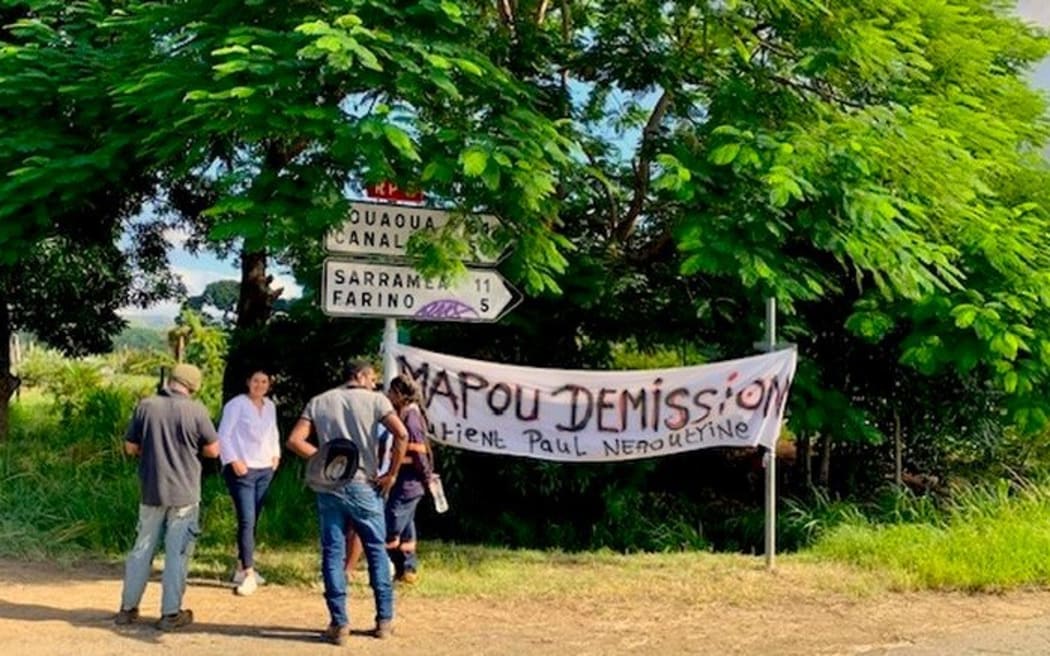
Mont-Dore Mayor Eddy Lecourieux told local Radio Rythme Bleu they had the right to demonstrate, “but they could have done that peacefully”.
“Instead, there’s always someone who starts throwing stones.”
At dusk, the Saint-Louis and Mont-Dore areas were described as under control, but security forces, including armoured vehicles, were kept in place.
“On top of that, there are more marches scheduled for this weekend,” Lecourieux said.
Pro-independence protesters oppose current plans to have a French Constitutional amendment endorsed by France’s two houses of Parliament.
As a first step of this Parliamentary process, last week, the Senate endorsed the text, but with some amendments.
Opposing marches
Pro-France movements also want to march on the same day in support of the amendment.
If endorsed, it would allow French citizens to vote at New Caledonia’s local elections, provided they have been residing there for an uninterrupted 10 years.
Pro-independent parties, however, strongly oppose the project, saying this would be tantamount to making indigenous Kanaks a minority at local polls, and would open the door to a “recolonisation” of New Caledonia through demographics.
A similar high-risk configuration of two marches took place on March 28 in downtown Nouméa, with more than 500 French security forces deployed to keep both groups away from each other.
French authorities are understood to be holding meeting after meeting to fine-tune the security setup ahead of the weekend.
Florent Perrin, the president of Mont-Dore’s “Citizens’ Association”, told media local residents were being “taken hostage” and the unrest “must cease”.
He urged political authorities to “make decisions on all political and economic issues” New Caledonia currently faces.
Perrin called on the local population to remain calm, but invited them to “individually lodge complaints” based on “breach of freedom of circulation”.
“On our side too, tensions are beginning to run high, so we have to remain calm and not respond to those acts of provocation,” he said.
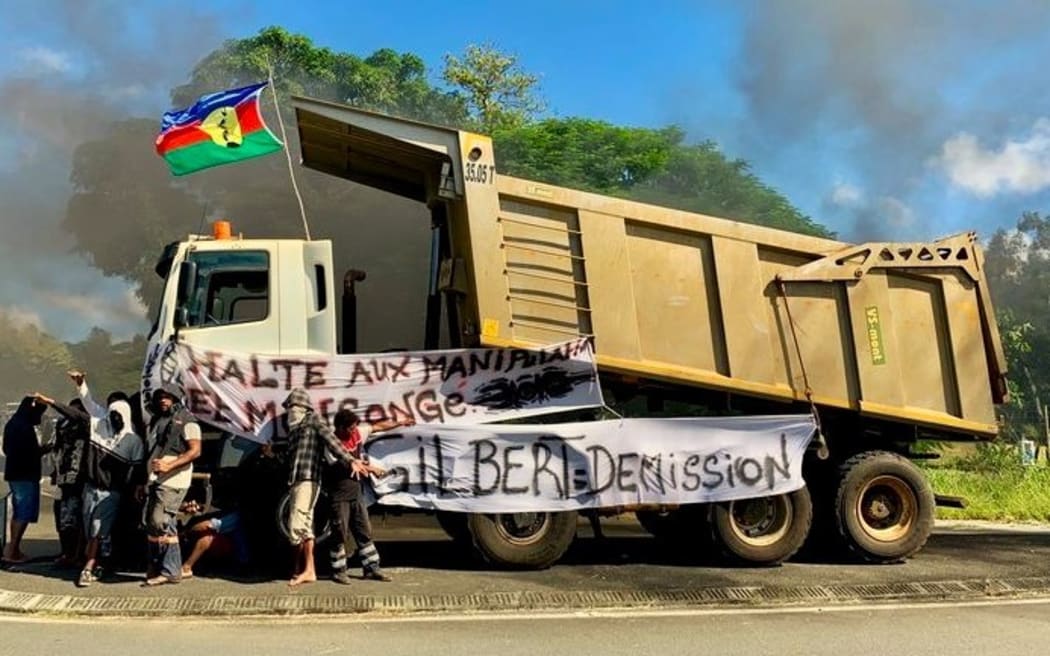
The ‘nickel pact’ issue
The clashes and blockades took place on the same day the local Congress was discussing whether it should give the green light to New Caledonia’s President Louis Mapou to sign the “nickel pact”, worth around 200 million euros (NZ$358 million) in French emergency aid.
In return, France is asking that New Caledonia’s whole nickel industry should undergo a far-reaching slate of reforms in order to make nickel less expensive and therefore more attractive on the world market.
The pact aims to salvage New Caledonia’s embattled nickel industry and its three factories — one in the north of the main island, Koniambo (KNS), and two in the south, Société le Nickel (SLN), a subsidiary of French giant Eramet, and Prony Resources.
KNS’ nickel-processing operations were put in “sleep”, non-productive mode in February after its major financier, Anglo-Swiss Glencore, said it could no longer sustain losses totalling 14 billion euros (NZ$25 billion) over the past 10 years, and that it was now seeking an entity to buy its 49 percent shares.
The other two companies, SLN and Prony, are also facing huge debts and a severe risk of bankruptcy due to the new nickel conditions on the world market, now dominated by new players such as Indonesia, which produces a much cheaper and abundant metal.
New ultimatum from Northern Province
On Tuesday, Northern province President Paul Néaoutyine added further pressure by threatening to suspend all permits for mining activities in his province’s nine sites, where southern nickel companies are also extracting.
In a release, Néaoutyine made references to payment guarantees deadlines on April 10 that had not been honoured by SLN.
It is understood SLN’s owner, Eramet, was scheduled to meet in a general meeting in Paris later on Tuesday.
The French pact — France is also a stakeholder in Eramet — would also help SLN provide longer-term guarantees.
Southern province President and Les Loyalists (pro-France) party leader Sonia Backès alleged on Tuesday that Néaoutyine wants to do everything he can to shut down SLN and block the nickel pact
“Now things are very clear — before it was all undercover; now it’s out in the open,” she said.
“Now we will do everything to maintain SLN, because this means 3000 jobs at stake.”
Congress dragging its feet
Yesterday, New Caledonia’s Congress was holding a meeting behind closed doors to again discuss the French pact.
The Congress decided to postpone its decision and, instead, suggested setting up a “special committee” to further examine the pact and the condition it is tied to, and more generally, “the nickel industry’s current challenges”.
Opponents to the agreement mainly argue that it would pose a risk of “loss of sovereignty” for New Caledonia on its precious metal resource.
They also consider the nickel industry stake-holding companies are not committing enough and that, instead, New Caledonia’s government is asked to raise up to US$80 million (NZ$132 million), mainly by way of new taxes imposed on taxpayers.
Last week, a group of Congressmen, mostly from pro-independence Union Calédonienne, one of the four components of the pro-independence FLNKS, with the backing of one pro-France party, Avenir Ensemble, had a motion adopted to postpone one more time the signing of the pact.
President Mapou defies pro-independence MPs
President Louis Mapou, himself from the pro-independence side, urged the supporters of the motion to “let [him] sign” last week during a Congress public sitting.
“Let’s do it . . . Authorise us to go at it . . . What are you afraid of?” he said.
“Are we afraid of our militants?”
Mapou said if there was no swift Congress response and support to sign the pact, for which he himself had asked the Congress for endorsement, he would “take [his] responsibility” and go ahead anyway.
“I will honour the commitment I made to the French State.”
He said if they wanted to to sanction him with a motion of no confidence to go ahead. He was not afraid of this.
Mapou also told the pro-independence side in Congress that he believed they khad ept postponing any Congress decision “because you want to engage in negotiations as part of [New Caledonia’s] political agreements”.
Last week, Backès, who expressed open support for Mapou’s “courage”, told Radio Rythme Bleu she and Mapou had both received death threats.
This article is republished under a community partnership agreement with RNZ.
This post was originally published on Asia Pacific Report.